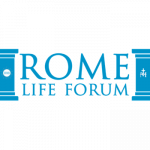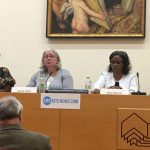“My soul doth magnify the Lord!” Mary’s words of praise and exultation arising from the breathtaking events of her life I assign to the grand event of your marriages: Your marriage doth magnify the Lord! May the same song of praise be on your lips.
The occasion of the 40th anniversary of Humanae Vitae (HV) prompts this reflection. I have chosen to address paragraph 25 of the document which could be considered the closing remarks of Pope Paul VI. These remarks are directed specifically to Catholic spouses. Firmly acknowledging the divine authority which he developed in HV, he encourages the faithful by reminding them of the superabundance of God’s love who never neglects to bestow the means to accomplish what He demands of his faithful people. HV names these means as the sacraments. They are not simply to help married Christians “get through” an arduous task, but they are to take the faithful beyond their own expectations of response in freedom and joy. However, just as one knows his/her role and how to use the necessary tools to succeed in a career because of a particular job description, do Christians know their role and that of the sacraments within the mission of Christ in order “to succeed”?
The observations of Pope Paul VI focus our attention on striving to carry out the Will of God and that it is a conscious living out the effects of the sacraments that impel each Christian forward on the path to holiness. This holiness, ultimately, is configuration to Christ who gave us the perfect example to imitate in his sincere gift of self. The uniqueness of the sacrament of Matrimony is the spouses’ own path to holiness. Living the challenges of HV is a specific element that the spouses must address in their configuration to Christ.
“40 years in the desert” is our theme, which is a reasonably clear reference to the 40 years that the Israelites spent wandering in the desert. This was their punishment for having “murmured” against God. I would like to adjust this picture and look at those 40 years in the context of the passing of time as not only a time of chastisement and exclusion from the Promised Land. Besides the hardships of the 40 years in the desert, the Israelites had 40 years to reflect on the words of the Lord spoken to them in Exodus 19:4-6:
You have seen for yourselves how I treated the Egyptians and how I bore you up on eagle wings and brought you here to myself. Therefore, if you hearken to my voice and keep my covenant, you shall be my special possession, dearer to me than all other people, though all the earth is mine. You shall be to me a kingdom of priests, a holy nation.
The Israelites were at the foot of Mt. Sinai when they heard these opening words of the gift of the Covenant. The people were told that they would become a nation of priests, a holy nation. Yet, they murmured. During the 40 years of wandering, they were given time to come to insights about what that meant. It was a time of purification (of heart, mind, and body) so that they could enter the Promised Land. Coming to terms with the reality of being called to be a “holy nation” would be a continual struggle for the People of God.
We have been instituted as the new People of God. At the foot of the Cross on Mt. Calvary, we are witnesses and participants as the New Covenant is made present in sacramental celebrations (CCC 1370). The effects of the blood and water that flowed from the side of Christ are poured out as we participate in His Paschal Mystery and benefit from the fruits of His crucified and resurrected body.
Thus, St. Peter has the “audacity” in 1 Peter 2:9 to exult using the same words of the Lord: “…[Y]ou are a chosen race, a royal priesthood, a holy nation, a people of his own”, … “so that you may announce the praises of him who called you out of darkness into his wonderful light”. And later in 2 Peter 1:4 we read: “…[H]e has bestowed on us the precious and very great promises, so that through them you may come to share in the divine nature.” United by baptism with the “one high priest” (Hebrews 2:17) we, share in His three-fold mission of Priest, Prophet and King. (CL 14). We recognize in the words of Christ that the cross of Calvary unites these three elements of His mission: “So Pilate said to him, ‘Then you are a king?’ Jesus answered, ‘You say I am a king. For this I was born and for this I came into the world, to testify to the truth’.” (Jn 18:37)
This three-fold mission of the People of God is treated with detail in Lumen Gentium (cf. nos. 9-11) and made quite practical by Pope Paul VI in HV.1 Clearly illustrating the indissoluble union of Christ with humanity, LG encourages the faithful to understand the firm bond existing between the reality of Christ’s Priesthood and their own priesthood which includes their own offering of prayer, liturgical and personal, as well as the offering of a virtuous life. This is the priesthood common to all because of our insertion into the Paschal Mystery through Baptism and furthered by Confirmation.
“Common” in the sense that we all share in this priesthood, but the way of offering and what we offer will differ according to our call. Matrimony includes a unique offering of the “sincere gift of self” (GS 24) as two individuals reciprocally hand over themselves and receive one another. Their consent which initiates this gift one to another is rooted in the Cross of Christ and the sacramental graces of Matrimony are the source of strength that are poured into their daily relationship of mutual and unitive offering.
Operating out of the dignity of each one’s individuality and place before God, naturally as we are each made in His image and likeness, supernaturally as we each are one of His children, we each have a participation in the Kingship of Christ. We act with authority over our lower nature, make good choices (no matter the cost), and be leaders of others either at the level of imitation or of clear guidance. Just as the Johannine paradox of Christ’s loving Kingship is most evident in His obedience to the will of the Father and was seen in the humiliation of the cross, the faithful fulfil their royal dignity most magnificently in their “sincere gift of self.” His deliberate faithfulness to the Truth that speaks of the Father is mirrored by spouses as they lead each other to holiness by challenging and supporting when necessary.
The Council Fathers emphasized that those who “unfailingly adhere to [the] faith, penetrat[ing] it more deeply with right judgment and appl[ying] it more fully in daily life” (LG 12) are participating in the mission of Christ as Prophet. As one who “announces praise” the Christian is a sign for all that this world is passing and we are made for an everlasting relationship with God. The married couple are the sacramental sign not only of Christ’s love for His Church now, but that his faithfulness will never cease. Their spousal union reflects the union awaiting us all with the Bridegroom as depicted in the Book of Revelation. The prophetic role of married spouses calls them to witness the joyful eschatological hope of Christianity.
Now, this three-fold description of the mission of Christ is exactly that–threefold. The mission of Christ intertwines the elements Priest, Prophet and King as not something that can be unwoven. The mission of the Church is to continue the work of the Lord for the “glory of God and the salvation of humanity”. (CL 14) This mission does not remain in theoretical or generic terms for Pope Paul VI who clarifies in HV 25 the sacrifice that married couples offer as part of the common priesthood. He says that they will “[make] visible to men and women the holiness and joy of the law … [of] God who is the Author of life”. He speaks of the “burden appointed to them”. This is not to be an imposition to the faithful couple but a willing shouldering of the cross entrusted to them, something in which they willingly engage, even embrace as members of the common priesthood. Within the context of HV and married life, we acknowledge that the “inviolable conditions” (HV 25) can be demanding. The carrying out of HV’s prescriptions should be seen from the perspective of the spouses’ mission within the Church. The spouses are joined “at the heart” with one another; together they strive to carry out the precepts contained in HV. For each couple, the challenges and blessings offered to them by the Lord are unique. It is their specific part to play as salvation history continues. Married couples must know that their prayer or acts of faithfulness are offerings to the Lord, the sacrificial response most appropriate to their state of life. As Abel offered the “firstlings of the flock,” the couple strives to offer the most pure sacrifice each can offer.
Their bond was begun at the foot of the Cross. Their regular attentive presence at the Eucharist cannot but help them become ever more aware that the pure sacrifice that is asked of them is an out- pouring of themselves joined to Christ’s own heart. They are His Bride! Nourished by His Body and Blood, they are fortified to remain and become more faithful to the Will of God. This is what “pure sacrifice” means: that their hearts are united, are in communion, with the Will of Christ.
HV does not ignore the fragility of human decisiveness. If the individuals do not act out of their sacramental dignity and so fall into sin, the sacrament of Penance is the remedy and spiritual revitalization. Not only are they reconciled with the Lord through a humble confession of sins, but their confession of a Merciful Lord is another aspect of Priest-Prophet- King. The forgiving Lord not only brings an individual back into relationship with Him, but effectively strengthens one’s resolve to grow.
The foregoing perspective encompasses a summarized vision of the implications of HV that allows individual couples to see the awesome privilege—and choices they are called to address and how to do so. Couples who freely/willingly embrace this understanding of the presence of God in their lives will nod knowingly at the words of the angel Gabriel to Mary: “For nothing is impossible for God.” (Lk 1:37). What thanksgiving and anticipation must have arisen within the heart of Mary soon after as she travelled toward Ein Karim and the home of Elizabeth so that she could break into the song of Magnificat: “My soul doth magnify the Lord!”









